Noida Techies Innovate New System That Can Cool Milk Without Using Electricity!
India is the the world's largest producer of milk. But 40-50% of the total production goes to waste — which is what makes this patented system so cool, no pun intended!
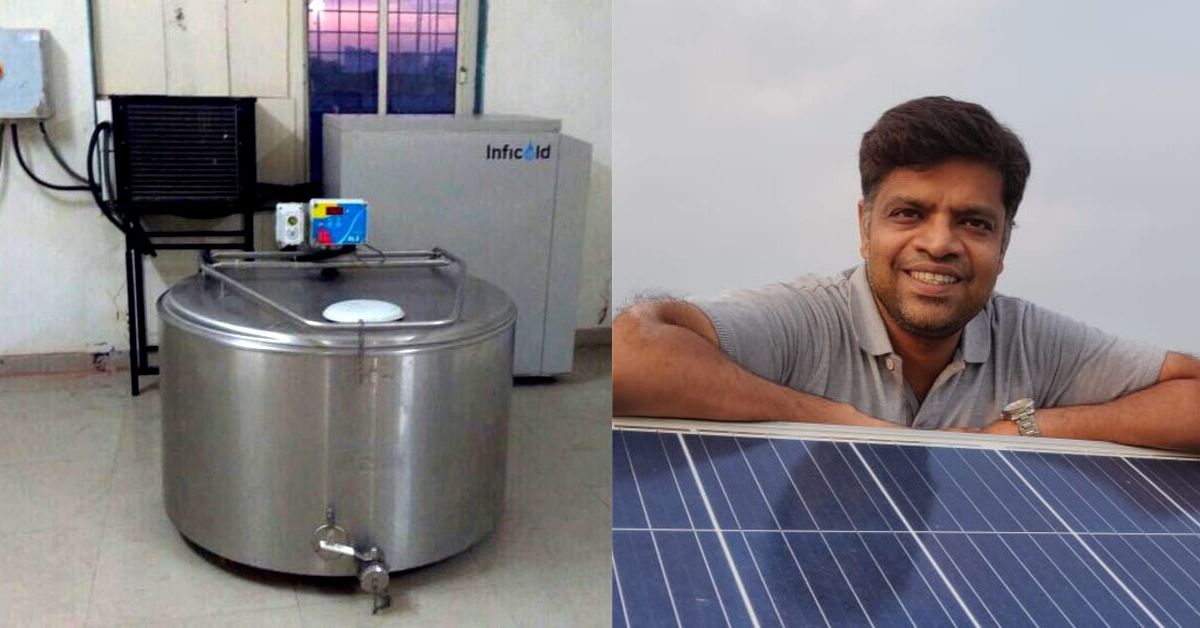
Despite being the world’s largest producer of milk and second largest producer of fruits and vegetables, almost $440 billion worth of produce ends up getting wasted, says a joint study by the ASSOCHAM and MRSS. In simpler terms, about 40 to 50 per cent of the total production goes to waste! The report goes on to add that the current number of cold storage facilities at 6,300, is only able to store about 11 per cent of the country’s total perishable produce.
Looking for fans that are energy efficient? Check out these fans from our shop that can help you achieve your goals of sustainable living!
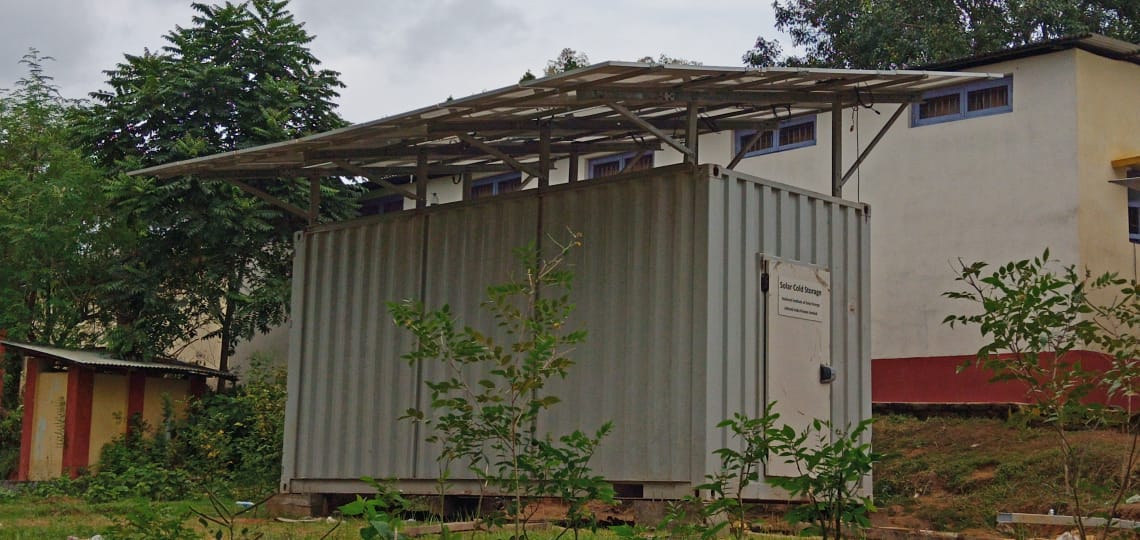
Inficold is a Noida-based start-up doing its bit to provide cold storage solutions with the objective to curb wastage. Not only is Inficold trying to patch this gap in the supply chain, they’re doing it sustainably. They have an off-grid solar cooling system which enables cooling of perishable items like fruits, vegetables, milk, fruits, flowers, among other things. This allows the farmer or producer to increase their profit margins.
Case in point, Jayant Chandavarkar, 40, a Bengaluru-based IT professional, who turned to agriculture and dairy farming with six cows about two and a half years back, along with his cousin. His 2.5-acre farm is in Tavarekere about 25 km from Bengaluru.
“Initially, we started selling to a Milk Cooperative but we realised that once we supply our milk to them, it gets mixed up with the rest of their stock. This makes it difficult to distinguish between different grades of milk,” says Jayant.
It was not long before they decided to supply milk independently. “The biggest hurdle is that once the cow is milked, the milk needs to be refrigerated immediately at four degree celsius,” informs Jayant. Once this major logistical gap was identified, he started looking for solutions which he found while browsing the internet when he came across Inficold.
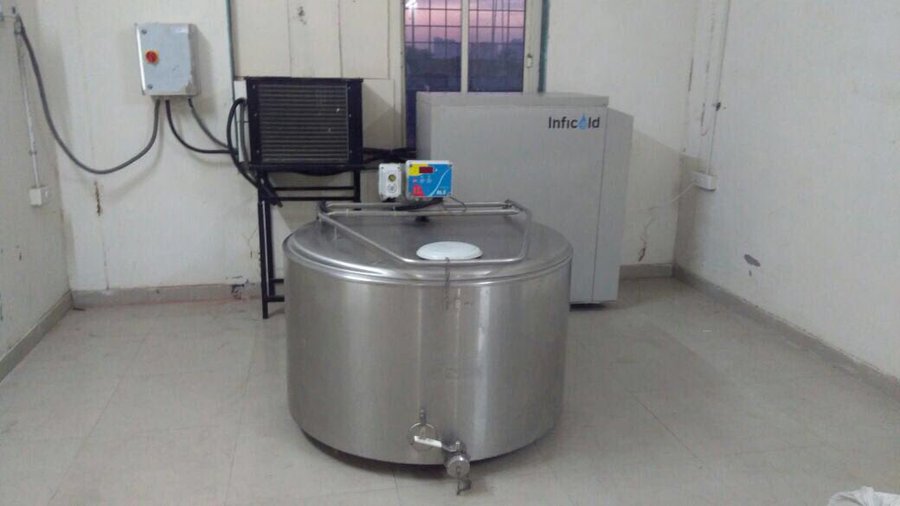
Jayant now has 40 adult cows that are producing milk which is stored in Inficold’s solar milk cooler. He says that he can store upto 100 litres of milk which he bottles up and sells to apartment complexes.
Inficold – The Background Story
Inficold was founded in August 2015 by Dr. Nitin Goel and Dr. Himanshu Pokharna, whose families have roots in the rural agricultural sector.
The friends and IIT-Bombay alumni used to work with Intel. After quitting Intel, Himanshu founded Sheetak, a company that provides high-efficiency electromagnetic green coolers that aim to phase out compressor systems. Nitin soon joined his company and the two started working closely on developing thermo-electric cooling systems.
“But, we soon realised that solar energy solutions are something we should explore which would serve useful in the Indian context. This realisation is what led to the founding of the startup in 2015,” says Nitin who has a PhD in solar cooling from the University of Florida
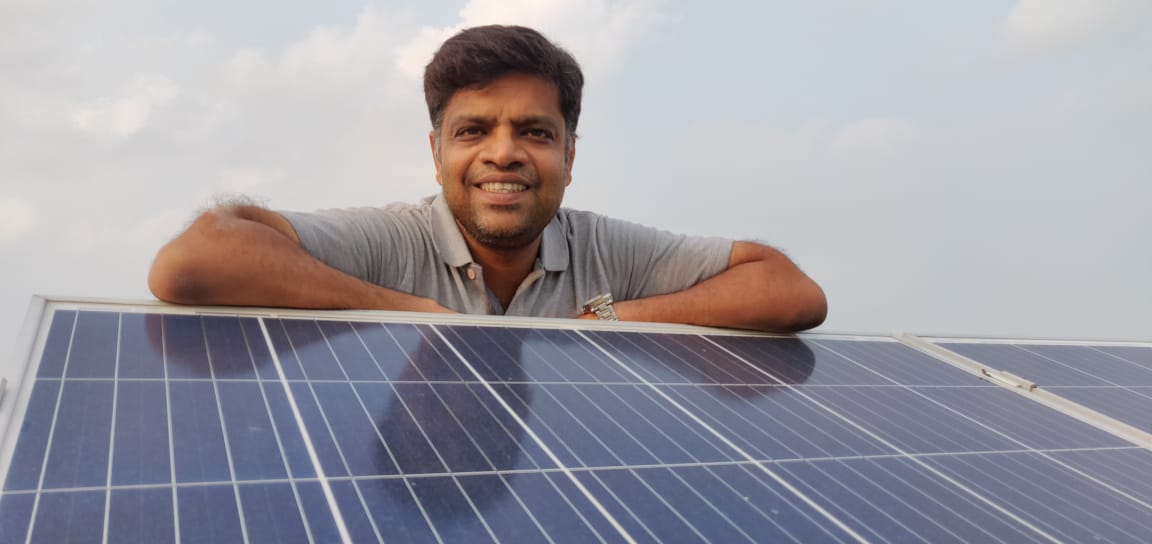
Inficold came up with patented thermal energy storage based cold chain solutions and have integrated solar technology to this. This solar integration been done in collaboration with the National Institute of Solar Energy (NISE). These solutions are meant for cooling milk, vegetables, fruits and other solid perishable materials in bulk.
Existing solar integration requires electric batteries and off-grid solar inverters where the inverters might give up after a point. It also requires replacement of electric batteries every 5 years. Inficold solar integration doesn’t require off-grid solar inverter or electric batteries and is most useful in case of sudden and prolonged power cuts. The cooling system can function without any kind of electricity for upto four days.
The cold storage solution for items like fruits, vegetables etc. comprises of an ISO Marine grade container which serves as the body of the cold storage. Inside the container is a condensing unit which uses electricity (generated from the solar panels above the container) to make ice and stores it in the thermal storage system.
This ice in the thermal storage provides cooling through the evaporating unit. Thermal energy storage acts as an energy buffer during low or non solar hours.
The cold storage solution has two options that the customers can choose from – one with a capacity of 5,000 kgs, while the other with a capacity of 10,000 kgs.
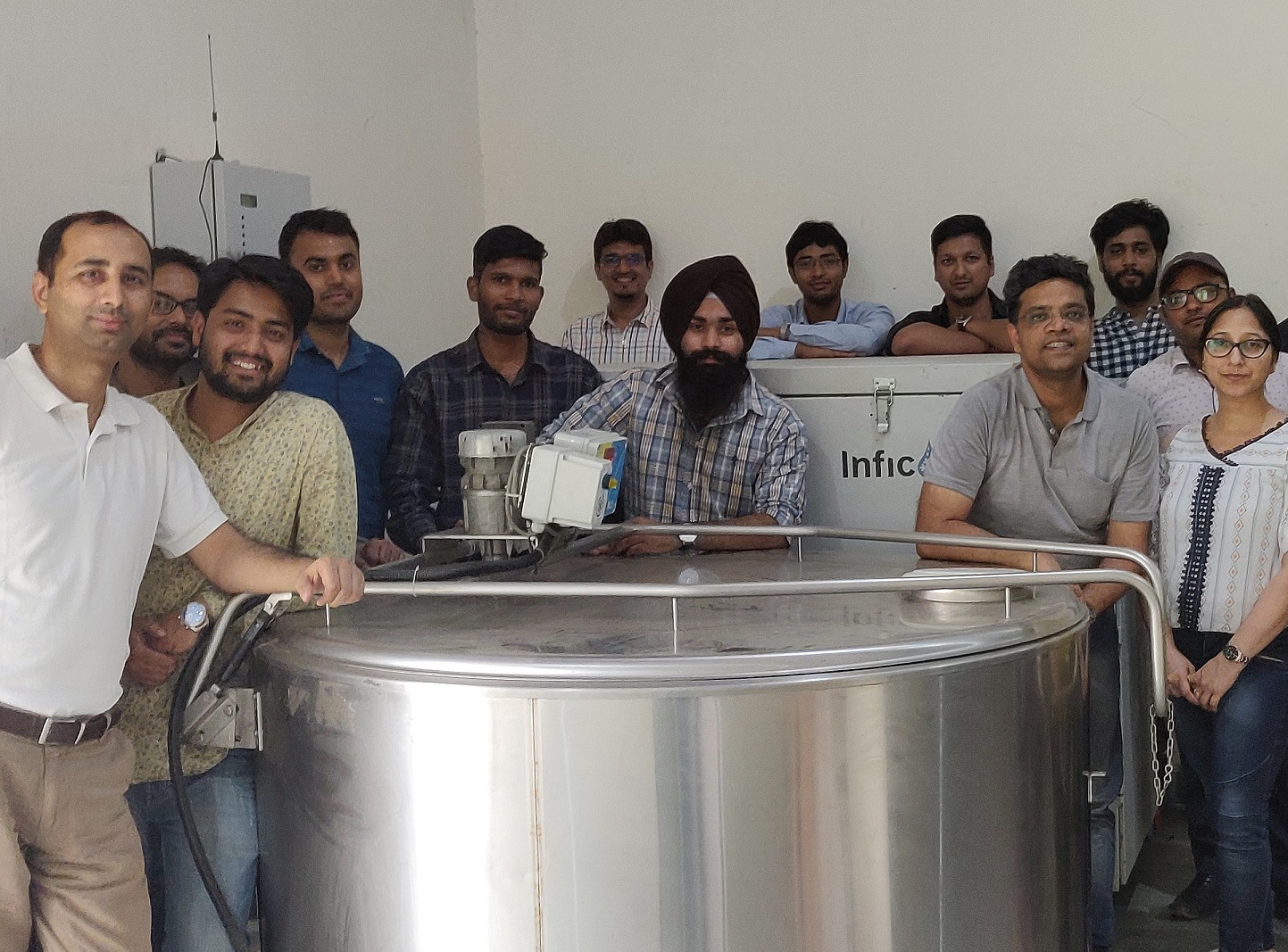
In case of Inficold’s solution for milk storage, the solar photovoltaic (PV) panels generate electricity which passes through a condensing unit to make ice in thermal storage unit. When there is no solar power, the thermal energy automatically provides cooling with the help of the ice stored in it.
Here, the customers can choose to install a unit with a capacity of 500 litres or 1,000 litres.
Challenges and Impact
Nitin says that throughout the process of development and deployment of their services, they have come across several challenges. One of the biggest challenges pertain to people’s perceptions regarding the effectiveness of solar integrated cold chain solutions.
“Previous efforts by other companies have not fetched favorable results due to obsolete technology integrations of solar and thermal energy storage. It has resulted in longer sales conversion period to convince the prospective customers about the upgraded and efficient solution,” says Nitin.
Despite all of this, Inficold’s solutions have been recognised and awarded by various tech platforms. One notable win for them was in the category of Low Carbon Technology Deployment Program, an initiative by United Nations Industrial Development Organization (UNIDO), the Bureau of Energy Efficiency (BEE) and Global Environment Facility (GEF).
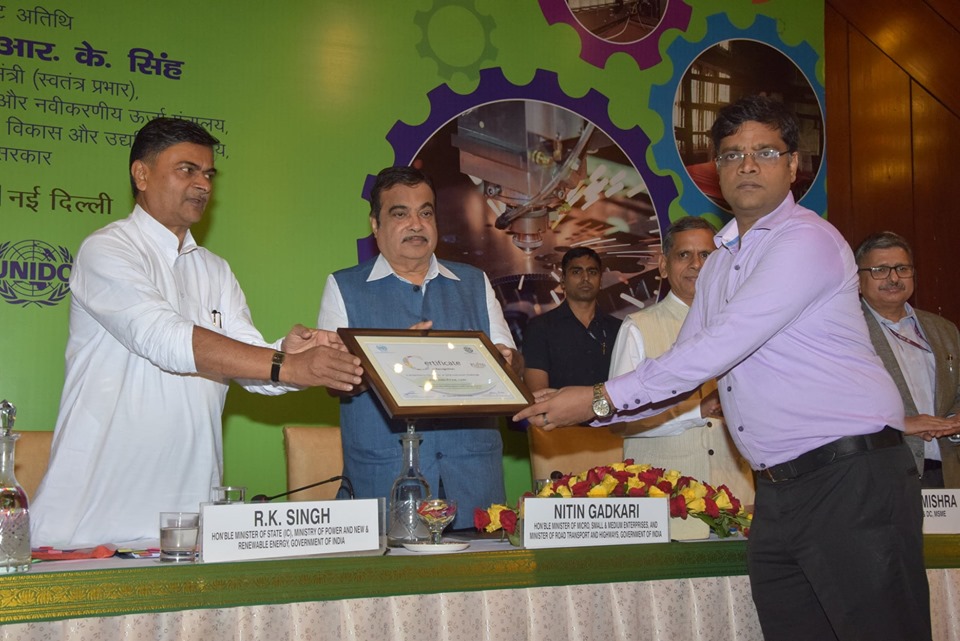
Inficold’s storage systems have now been installed in states like Assam, Karnataka, Kerala, Maharashtra and Tripura. They are catering to big dairy cooperatives and even small dairy farmers and their solution has even been installed at a temple in Gokarna!Kumar PK, 38, Maintenance and construction Manager at the Mahabaleshwara Temple in Gokarna says that they have been using Inficold’s cold storage solution for over a month now. The need for this arose because the temple served food without charge to about 1,000 to 1,500 devotees in a day.
“We serve food in the afternoon and at night everyday. For this we would end up buying a lot of vegetables which would get wasted because we live in a coastal town and it gets really hot in the day,” he says.
But, he says that prepping for meals have become easier for them after the cooling storage system was installed. “Before, we would have to wake up really early and start prepping the meals. But now, we can finish half our work the night before without anything going stale,” he says.

Inficold is now providing their services to about 15 clients across the country. “Our clients are milk cooperatives in Sikkim, Karnataka, Uttar Pradesh, Punjab and Gujarat. We are also working with a private large dairy in Maharashtra. Our solar cold storage units are installed by state governments of Kerala and Tripura, which are being used by farmers to extend shelf life of perishable commodities such as fruits and vegetables,” says Nitin.
He adds that they are also working closely with social impact led foundations such as Selco Foundation to develop sustainable use cases for increasing farmer incomes.
So, what is in store for Inficold now?
“In the next 2 years, Inficold would like to have 1000+ solar integrated cooling installations across dairy, horticulture and various other value added agriculture segments. The primary vision is to double farmer income while creating a sustainable cold chain network across India,” says Nitin signing off.
Also Read: A Husband-Wife Duo Is Harvesting Rainwater & Solar Energy at the Same Time – Using an Umbrella!
Photo source: Inficold
(Edited by Saiqua Sultan)
Like this story? Or have something to share?
Write to us: [email protected]
Connect with us on Facebook and Twitter.
If you found our stories insightful, informative, or even just enjoyable, we invite you to consider making a voluntary payment to support the work we do at The Better India. Your contribution helps us continue producing quality content that educates, inspires, and drives positive change.
Choose one of the payment options below for your contribution-
By paying for the stories you value, you directly contribute to sustaining our efforts focused on making a difference in the world. Together, let’s ensure that impactful stories continue to be told and shared, enriching lives and communities alike.
Thank you for your support. Here are some frequently asked questions you might find helpful to know why you are contributing?


This story made me
-
97
-
121
-
89
-
167











